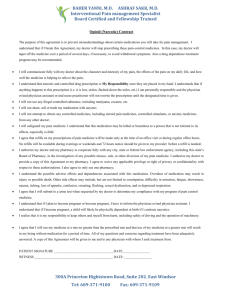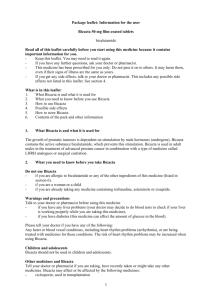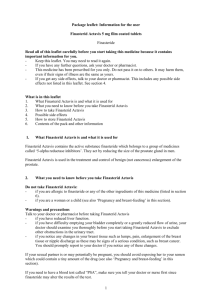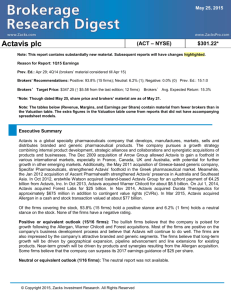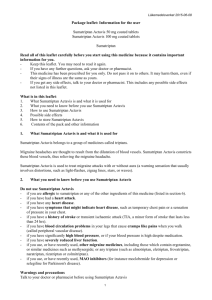Paroxetin Actavis film
advertisement
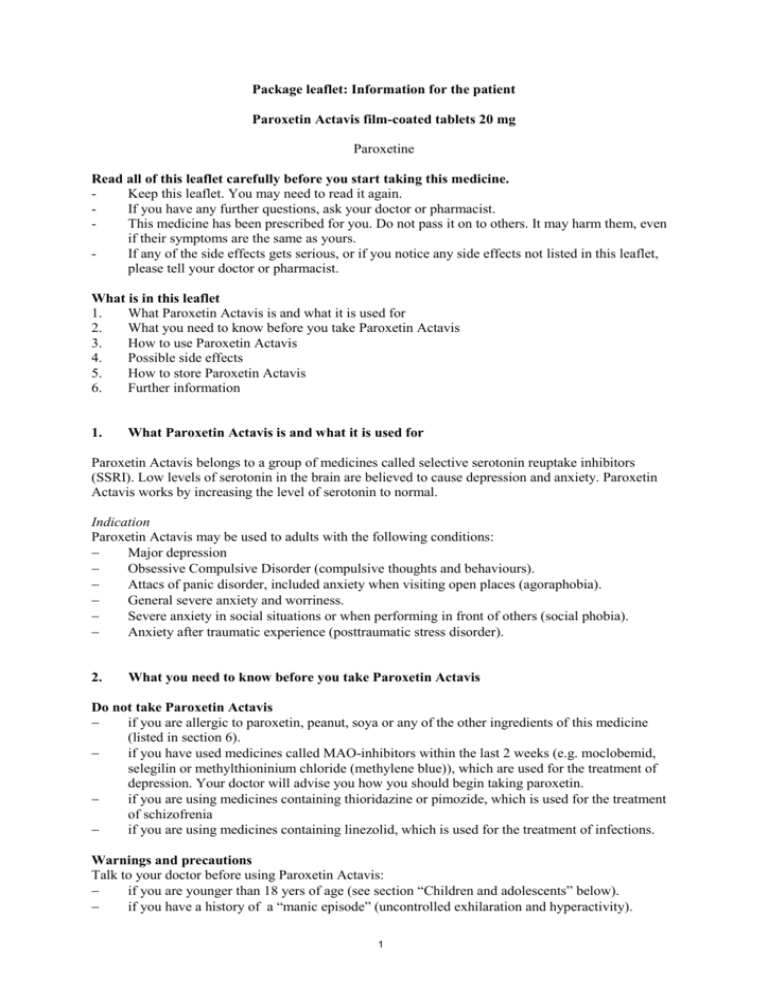
Package leaflet: Information for the patient Paroxetin Actavis film-coated tablets 20 mg Paroxetine Read all of this leaflet carefully before you start taking this medicine. Keep this leaflet. You may need to read it again. If you have any further questions, ask your doctor or pharmacist. This medicine has been prescribed for you. Do not pass it on to others. It may harm them, even if their symptoms are the same as yours. If any of the side effects gets serious, or if you notice any side effects not listed in this leaflet, please tell your doctor or pharmacist. What is in this leaflet 1. What Paroxetin Actavis is and what it is used for 2. What you need to know before you take Paroxetin Actavis 3. How to use Paroxetin Actavis 4. Possible side effects 5. How to store Paroxetin Actavis 6. Further information 1. What Paroxetin Actavis is and what it is used for Paroxetin Actavis belongs to a group of medicines called selective serotonin reuptake inhibitors (SSRI). Low levels of serotonin in the brain are believed to cause depression and anxiety. Paroxetin Actavis works by increasing the level of serotonin to normal. Indication Paroxetin Actavis may be used to adults with the following conditions: Major depression Obsessive Compulsive Disorder (compulsive thoughts and behaviours). Attacs of panic disorder, included anxiety when visiting open places (agoraphobia). General severe anxiety and worriness. Severe anxiety in social situations or when performing in front of others (social phobia). Anxiety after traumatic experience (posttraumatic stress disorder). 2. What you need to know before you take Paroxetin Actavis Do not take Paroxetin Actavis if you are allergic to paroxetin, peanut, soya or any of the other ingredients of this medicine (listed in section 6). if you have used medicines called MAO-inhibitors within the last 2 weeks (e.g. moclobemid, selegilin or methylthioninium chloride (methylene blue)), which are used for the treatment of depression. Your doctor will advise you how you should begin taking paroxetin. if you are using medicines containing thioridazine or pimozide, which is used for the treatment of schizofrenia if you are using medicines containing linezolid, which is used for the treatment of infections. Warnings and precautions Talk to your doctor before using Paroxetin Actavis: if you are younger than 18 yers of age (see section “Children and adolescents” below). if you have a history of a “manic episode” (uncontrolled exhilaration and hyperactivity). 1 if you have renal-, liver- or cardiac disorder. if you have diabetes. if you have epilepsy or have a history of seizures. If you are in treatment with electro-convulsive therapy if you have glaucoma. if you get bruises or bleedings easily or if you use medicines causing increased risk of bleedings (e.g. warfarin, acetylsalicylic acid or ibuprofen). if you using other medicines for depression. if you are pregnant, may be pregnant or if you are breast feeding (see section “Pregnancy, breast-feeding and fertility” below) Special caution should be taken with Paroxetin Actavis if you are older than 65 years of age or have liver disorder, since Paroxetin Actavis in rare cases may reduce the sodium level in the blood (hyponatremia), which may cause symptoms as sleepiness and muscle weakness. It may appear more often if you have a disease called liver cirrhosis and/or if you use other medicines with known risk to cause hyponatremia. If you experience those symptoms, consult your doctor immediately. Elderly patients over 50 years have an increased risk of bone fractures while using paroxetin or others medicines for treatment of depression (e.g tricyclic antidepressants such as clomipramine, nortriptyline, desipramine or SSRIs as citalopram or fluoxetin). Thoughts of suicide and worsening of your depression or anxiety disorder If you are depressed and/or have anxiety disorders you can sometimes have thoughts of harming or killing yourself. These may be increased when first starting antidepressants, since these medicines all take time to work, usually about two weeks but sometimes longer. You may be more likely to think like this: - If you have previously had thoughts about killing or harming yourself. - If you are a young adult. Information from clinical trials has shown an increased risk of suicidal behaviour in adults aged less than 25 years with psychiatric conditions who were treated with an antidepressant. If you have thoughts of harming or killing yourself at any time, contact your doctor or go to a hospital straight away. You may find it helpful to tell a relative or close friend that you are depressed or have an anxiety disorder, and ask them to read this leaflet. You might ask them to tell you if they think your depression or anxiety is getting worse, or if they are worried about changes in your behaviour. When you begin to use Paroxetin Actavis Symptoms of restlessness, agitation and difficulties with standing or sitting still may occur during the first weeks of treatment. Even if you begin to feel better it is important to continue the treatment with the medicine as long as your doctor recommends, in order to avoid relapse. This means probably at least 6 months after improvement of the depression and even longer in treatment of panic disorder and obsessive compulsive disorder. In treatment of other disorders your doctor will inform you how long you should use Paroxetin Actavis. Children and adolescents Paroxetin Actavis should normally not be used in treatment of children and adolescents younger than 18 years of age. The risk of side effects, such as suicide attempts, suicidal thoughts and hostility (predominantly aggression and anger), are higher in patients younger than 18 years of age when using this kind of medication. Despite this, Paroxetin Actavis may be prescribed by a doctor to patients under age of 18 years, if he considers it appropriate. If you are under age of 18 years and want to discuss why you received this product, contact your doctor again. You should also inform your doctor if you experience any of the above mentioned symtoms or if they get worse. The longterm effects on growth, maturation and cognitive and behavioural development have not been established in children and adolescents under age 18 years. 2 Other medicines and Paroxetin Actavis Tell your doctor or pharmacist if you are taking, have recently taken or might take any other medicines. Some medicines can affect the way Paroxetin Actavis works, or make it more likely that you’ll have side effects. Paroxetin Actavis can also affect the way some other medicines work. These include: other medicines for treatment of depression, e.g. tricyclic antidepressants (clomipramine, nortriptyline and desipramine), or SSRIs (citalopram or fluoxetin). other medicines affecting serotonin, e.g. L-tryptophan, MAO-inhibitors (moclobemide, selegilin or methylthioninium chloride (methylene blue)), certain medicines for treatment of migraine (zolmitriptane or almotriptane), tramadol, linezolid, pethidine, lithium or remedies containing St John´s Wort. certain medicines for treatment of Parkinson´s Disease or other movement disorders (procyclidin). certain medicines for treatment of irregular heartbeat (arytmia), high blood pressure or angina pectoris, (e.g. propafenone and flecainide). Metoprolol, a beta-blocker used to treat high blood pressure and heart problems Pravastatin, used to treat high cholesterol certain medicines affecting blood coagulation and increasing the risk of bleedings, such as oral anticoagulants (warfarin), and pain relieving and anti-inflammatory medicines (e.g. ibuprofen, acetylsalicylic acid, diclofenac and naproxen). certain medicines for treatment of epilepsy (carbamazepine, phenytoin, fenobarbital, sodium valproate). medicines for the treatment of schizofrenia (thioridazine, perphenazine, risperidone, clozapine). certain antibiotics (rifampicin) medicines for general anesthesia or treatment of chronic pain (fentanyl) medicines for the treatment of psychosis (pimozide) medicines for the treatment of attention deficit hyperactivity disorder –ADHD (atomoxetine) certain medicines for treatment of breast cancer (tamoxifen) Paroxetin Actavis with food, drink and alcohol Preferably take the medicine in connection to breakfast. You should swallow Paroxetin Actavis with water. As with many other medicines, it is not recommended to use alcohol as long as you use Paroxetin Actavis. Pregnancy, breast-feeding and fertility Pregnancy Since use of Paroxetin Actavis during the first three months of the pregnancy may bring a small increased risk of fetal malformation (cardiac malformation), it is important to inform your doctor if you are pregnant or planning to become pregnant. Your doctor will decide if treatment with Paroxetin Actavis is still necessary, or if any other treatment is possible to chose as an alternative. Do not interrupt the treatment without consulting your doctor. Sudden interruption of treatment may cause so called withdrawal symptoms (se section “Possible effects after treatment interruption of Paroxetin Actavis”). Make sure your midwife and/or doctor know you are on Paroxetin Actavis.When taken during pregnancy, particularly in the last 3 months of pregnancy, medicines like Paroxetin Actavis may increase the risk of a serious condition in babies, called persistent pulmonary hypertension of the newborn (PPHN), making the baby breathe faster and appear bluish. These symptoms usually begin during the first 24 hours after the baby is born. If this happens to your baby you should contact your midwife and/or doctor immediately. 3 In pregnancies where Paroxitin Actavis have been used until the birth the following symptoms have been reported for the child in absolute connection to birth: Sleeping difficulties, spasmodic, continuous crying, irritability, breast feeding difficulties, increased sleepiness, shaking, vomiting, low blood suger, breathing difficulties, darkblue or violet discolouring of the skin, convulsions, tense or limp muscles and difficulties to regulate the bodytemperature. Those symptoms are transient. If your child get any of symptoms you should immediately contact your doctor or nurse. Breast feeding Talk to your doctor before you use any medication, included Paroxetin Actavis. Fertility Paroxetine has been shown to reduce the quality of sperm in animal studies. Theoretically, this could affect fertility, but impact on human fertility has not been observed as yet. Driving and using machines Caution should be considered when driving or using machines until you know how you react on treatment. If you get tired or sleepy you should avoid such activities. Paroxetin Actavis contains lecithin soya If you are allergic to peanut or soya, do not use this medicinal product. 3. How to take Paroxetin Actavis Always take this medicine exactly as your doctor has told you. Check with your doctor or pharmacist if you are not sure. Your doctor will decide what dose you should take, which is individually adapted for you. Depending on the respons of the treatment your doctor may decide to increase or decrease the dose gradually. The highest recommended dose is 50 mg and in certain cases 60 mg. If you are older than 65 years of age the dose should not exceed 40 mg daily. You should continue using the medicine even if you are not feeling better immediately, since it might take a couple of weeks before Paroxetin Actavis works. If you experience the effect of Paroxetin Actavis to strong or to weak or if you have any other problem that you think might relate to the treatment with Paroxetin Actavis, you should talk with your doctor or pharmacist. It is important not change or interrupt the treatment without first contacting your doctor. If you take more Paroxetin Actavis than you should Contact your doctor or a hospital if you have taken more Paroxetin tablets than stated in this leaflet or more than your doctor has prescriebed. The most common symtoms of an overdose are vomiting, dilated pupils, fever, changes in blood pressure, headache, involuntary muscular contractions, restlessness, anxiety and rapid heart rhythm. If you forget to take Paroxetin Actavis Wait and take the next dose at the usual time next day and continue as usual thereafter. Do not take a double dose to make up for a forgotten dose. If you stop taking Paroxetin Actavis Do not interrupt the treatment with Paroxetin Actavis until your doctor tells you. Usually the doctor will advise you to slowly decrease the dose gradually during a couple of weeks. When you stop the treatment with Paroxetin Actavis, and especially if it has been done sudddenly, there is risk of so called withdrawal symtoms (see section “Withdrawal symptoms when stopping treatment”). 4 4. Possible side effects Like all medicines, this medicine can cause side effects, although not everybody gets them. See your doctor if you get any of the following side effects during treatment: You may need to contact your doctor or go to a hospital straight away. Uncommon side effects (may affect up to 1 in 100 people): If you have unusual bruising or bleeding, including vomiting blood or passing blood in your stools, contact your doctor or go to a hospital straight away. If you find that you are not able to pass water, contact your doctor or go to a hospital straight away. Rare side effects (may affect up to 1 in 1,000 people): If you experience seizures (fits), contact your doctor or go to a hospital straight away. If you feel restless and feel like you can’t sit or stand still, you may have something called akathisia. Increasing your dose of Paroxetin Actavis may make these feelings worse. If you feel like this, contact your doctor. If you feel tired, weak or confused and have achy, stiff or uncoordinated muscles this may be because your blood is low in sodium. If you have these symptoms, contact your doctor. Very rare side effects (may affect up to 1 in 10,000 people): Allergic reactions which may be severe to Paroxetin Actavis If you develop a red and lumpy skin rash, swelling of the eyelids, face, lips, mouth or tongue, start to itch or have difficulty breathing (shortness of breath) or swallowing and feel weak or lightheaded resulting in collapse or loss of consciousness, contact your doctor or go to a hospital straight away. Serious skin rashes (including erythema multiforme, Stevens-Johnson syndrome and toxic epidermal necrolysis) Serious skin rashes are potentially life-threatening and require immediate medical attention. These appear initially as circular patches often with central blisters usually on arms and hands or legs and feet, more severe rashes may include blistering of the chest and back. Additional symptoms such as infection of the eye (conjunctivitis) or ulcers of the mouth, throat or nose may occur. Severe forms of rash may progress to widespread peeling of the skin which can be life threatening. These serious skin rashes are often preceded by headache, fever, body aches (flu-like symptoms). If you develop a rash or these skin symptoms, stop taking Paroxetin Actavis and contact your doctor immediately. If you have some or all of the following symptoms you may have something called serotonin syndrome. The symptons include feeling confused, feeling restless, sweating, shaking, shivering, hallucinations ( strange visions or sounds), sudden jerks of the muscles or a fast heartbeat. If you feel like this contac your doctor. Acute glaucoma. If your eyes become painful and you develop blurred vision, contact your doctor. Side effects with frequency not known (frequency cannot be estimated from the available data): If you have thoughts of harming or killing yourself at any time, contact your doctor or go to a hospital straight away(see section 2). Other possible side effects during the treatment Very common: may affet more than 1 in 10 people Feeling sick (nausea), change in sexual drive or sexual performance (or example lack of orgasm and, in men, impaired erection and ejaculation), impaired concentration. Common side effects: may affect up to 1 in 10 people 5 Reduced appetite, not sleeping well (insomnia) or sleepiness, restlessness, abnormal dreams including nightmares, feeling dizzy or shaky (tremors), blurred vision, headache, yawning, dry mouth,vomiting, diarrhoea or constipation, sweating and feeling weak, weight gain, high levels of cholesterol in the blood. Uncommon: may affect up to 1 in 100 people Getting bruises and abnormal bleedings easily, especially in the skin and mucosal membrane, confusion, hallucinations, involontary body- or face movements, abnormal dilation of the pupil, fast heartbeat, temporary high or low bloodpressure (usally in patients with anxiety or hig blood pressure), rash, itching, uncontrollable and involuntary passing of urine. If you are a diabetic patient you may notice a loss of control of your blood sugar levels whilst taking Paroxetin Actavis . Please speak to your doctor about adjusting the dosage of your insulin or diabetes medications. Rare: may affect up to 1 in 1,000 people Overactive behaviour or thoughts (mania), anxiety, feeling detached from yourself (depersonalisation), panic attacks, (these symptoms may also be a consequence of the underlying disease), slow heartbeat, elevated liver function tests, abnormal production of breast milk in men and women,, joint and muscle pain, restless legs syndrome (RLS). Very rare: may affect up to 1 in 10,000 people Jaundice (yellow colouring of skin and eyes) due to liverdisorder, sensitivity to sunlight, elevated levels of ADH hormone causing fluid- or water retention, oedema (swollen arms or legs), reduced amount of platelets in the blood, persistent penis erection, hives. Not known: frequency cannot be estimated from the available data Aggression. An increased risk of bone fractures has been observed in patients taking this type of medicines, buzzing, hissing, whistling, ringing or other persistent noise in the ears (tinnitus) Withdrawal symptoms when stopping treatment According to studies 3 in 10 patients experience so called withdrawal symptoms when stopping treatment with Paroxetin Actavis. The risk is increased if Paroxetin Actavis have been used during a longer period of time with high doses, or if the dose have been reduced to fast. Most of the symptoms are transient and will disappear within two weeks. When you stop using Paroxetin Actavis your doctor may recommend you to reduce the dose gradually. If it is not reduced gradually, there is a higher risk of withdrawal symptoms. Contact your doctor if you experience severe withdrawal symptoms after stopping treatment with Paroxetin Actavis. Your doctor may advise you to begin using Paroxetin Actavis in order to reduce the dose more slowly. If you experience withdrawal symptoms it does not mean that you are dependent or not able to stop using Paroxetin Actavis. Common withdrawal symptoms: dizziness (unsteady, difficulties with balance), sensory disturbances as “pins and needles” and less common electric shock sensations, sleep disturbances and vivid dreams, anxiety, headache. Uncommon withdrawal symptoms: feeling sick (nausea), swetting, tremor (shaking), confusion, emotional instability, visual diturbances, pounding heartbeat, diarrhoea, irritability. Side effects and withdrawal symptoms in children and adolescents younger than 18 years of age When children and adolescents younger than 18 years of age get treatment with Paroxetin Actavis the following side effects may appear commonly: emotional changes included crying, mood changes, hostility or unfriendly behaviour (especially in children below 12 years of age with compulsive thoughts and behaviours), loss of appetite, shaking, abnormal sweating, hyperactivity, overweight, bleeding related adverse events predominantly of the skin and mucous membranes and agitation. 6 When children and adolescents younger than 18 years of age stop using Paroxetin Actavis the following common withdrawal symptoms may appear, in addition to the symptoms appearing in adults: emotional changes (included crying, mood changes, attempt to harm themselves, suicidal thoughts and suicide attempts), abdominal pain, dizziness, nausea and nervousness. Reporting of side effects If you get any side effects, talk to your doctor or pharmacist. This includes any possible side effects not listed in this leaflet. You can also report side effects directly via the national reporting system listed in Appendix V. By reporting side effects you can help provide more information on the safety of this medicine. 5. How to store Paroxetin Actavis Keep this medicine out of the sight and reach of children. Do not use this medicine after the expiry date which is stated on the label or carton after “EXP”. The expiry date refers to the last day of that month. Do not throw away any medicines via wastewater or household waste. Ask your pharmacist how to throw away medicines you no longer use. These measures will help protect the environment. 6. Contents of the pack and other information What Paroxetin Actavis contains The active substance is paroxetine hydrochloride equal to 20 mg paroxetine. The other ingredients are : Magnesium stearate, sodium starch glycolate, mannitol (E421), microcristalline cellulose, polymetacrylate, polyvinyl alcohol, talc, lecithin soya (E 322), xanthan gum (E 415) and titanium dioxide (E171). What Paroxetin Actavis looks like and contents of the pack Paroxetin Actavis filmcoated tablets are white and scored. Pack sizes Blister packs 20, 50, 60 and 100 tablets. 5x20 and 10x20 tablets. Plastic bottle 20, 60, 100, 200 and 250 tablets. Marketing Authorisation Holder and Manufacturer Sweden Iceland Actavis Nordic A/S Actavis hf., Ørnegårdsvej 16 Reykjavikurvegur 78, DK-2820 Gentofte IS-222 Hafnarfjordur, Denmark Iceland Manufacturers Actavis hf., Reykjavikurvegur 78, IS-222 Hafnarfjordur, Iceland Actavis Ltd. B16 Bulebel Industrial Estate Zejtun, ZTN 08 Malta Balkanpharma – Dupnitsa AD 3 Samokovsko Shosse Str. Dupnitsa 2600 Bulgaria 7 This medicinal product is authorised in the Member States of EEA under the following names: Sweden: Paroxetin Actavis Iceland: Paxetin This leaflet was last revised in 2015-06-18 8



